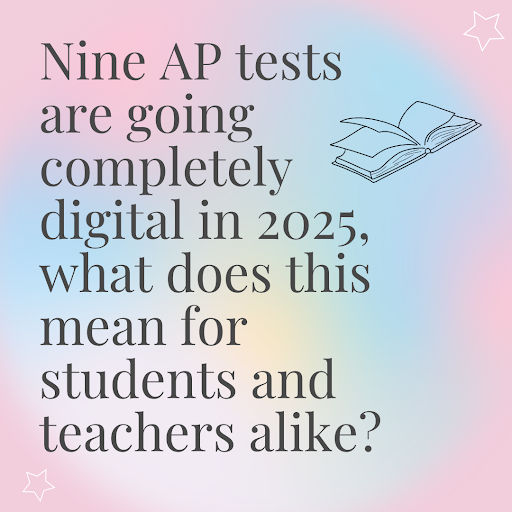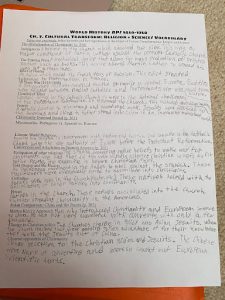
The College Board has announced that in 2025 nine AP exams will be going fully digital with no paper option unless students have approved accommodations that require paper testing. This really is no surprise with the College Board moving both the ACT and the SAT online earlier this school year.
With this announcement, concerns have been brought up including how test taking will look different now that it’s going digital.
“Digital exams are the future of AP testing,” College Board said. “They remove the need to manage paper exam booklets on exam day and reduce the risk of exam security issues and lost exam responses.”
AP U.S. History and AP U.S. Government teacher Robert Rivera has some concerns with the ease of interacting with the exam with the new format.
“All [AP] tests have some writing now, even math, my concern is how do you interact with a document on a screen instead of on a piece of paper?” Rivera said.
AP World History teacher Robert Northrup said he has similar concerns.
“My concern is for cheating,” Northrup said. “A great example is vocab, why wouldn’t I just cut and paste the whole thing. But, if I have to write it out then I have to think about what I’m doing.”
Cheating on the actual exams is probably not very likely.
“Digital AP Exams are designed with security in mind,” said College Board. “They include features that schools are familiar with from other digital tests such as encrypted exam questions and preventing students from accessing the internet and other applications during testing.”
Another concern is the effect the new format will have on test scores. In a 2011 study by the British Journal of Educational Technology which studied 59 students who completed a pre-lesson questionnaire, the students who took the lessons on paper performed 24% better than the students who took the lessons on a screen.
“The College Board claims that there’s no real difference in test scores– I think they just curved them so that they look similar,” Rivera said.
Sophomore Ridhi Patel who has or is currently taking five different AP courses has a different opinion.
“I feel like test scores will increase, it’s basically like the SAT.”
More than 350,000 digital AP Exams were administered in May 2022 and May 2023, and more than 4 million digital PSAT/NMSQT tests were administered in October 2023.
“In our surveys, students have indicated a strong preference for the digital exam experience, which allows them to type rather than hardwrite free responses,” College Board said.
Some people believe digital exams may not have such a strong effect due to the fact that Gen-Z has been raised around technology.
“Your generation [Gen-Z] has grown up around computers,” Rivera said. You’re very comfortable working with computers. From that perspective, I think it could be good.”

But still, going completely digital might not be the best idea. AP exams take between 2-3 hours to complete. Staring at a computer screen for hours on end can cause “Computer Vision Syndrome,” multiple short-term physical conditions which can lead to blurred vision, watery eyes, headaches and more.
This change may cause students to experience this, possibly leading to other negative health effects.
“I don’t look forward to doing all the grading online,” Northrup said. “I stare at that screen for way too much already.”
Computers can also cause students to become off track while in class and while doing assignments.
“You guys [students] will have to learn the skill of staying focused with the temptation of Tetris and the temptation of [email],” Rivera said. “I think kids will have to learn how to focus.”
So, how will teachers shift from teaching classes with tests on two completely different platforms?
“We might start using AP Classroom more or we might start having to investigate other online platforms,” Rivera said.
But still, this change might create problems for some teachers.
“I’m gonna have to shift from everything we do by hand, that will probably become electronic which will be a pain,” Northrup said.
With everything becoming more and more digital these days, it’s no shock that the College Board is pushing for more and more digital exams.
“I’d rather get a little bit of the individuality of the students through their handwriting,” Northrup said. “But I can’t stand in the way of progress because this is progress, right?”




![Spider webs, signs, ghosts and different types of candy are examples of how a trunk could be decorated to interest the children participating in Trunk or Treat. “I plan on decorating [my car] with fun spider webs and playing fun Halloween music,” Kurilenko said. Graphic made by Aleah Rothstein.](https://theSHSCourier.com/wp-content/uploads/2025/10/unnamed-2025-10-21T145747.705.png)







![The Solon Girls Golf Team played at the Tanglewood Club at the District Tournament. The course was quite difficult, said coach Damien Kopkas.
“[The course] got a little narrow in spots, certain holes were a little tighter and tree lined," Kopkas said. "There was a lot of elevation changes, so a lot of walking down hills and having to adjust, playing different shots, using different clubs based on whether it was an uphill or a downhill shot."
Image illustrated by Halina Vitkouskaya.](https://theSHSCourier.com/wp-content/uploads/2025/10/unnamed-2025-10-14T105212.017.jpg)